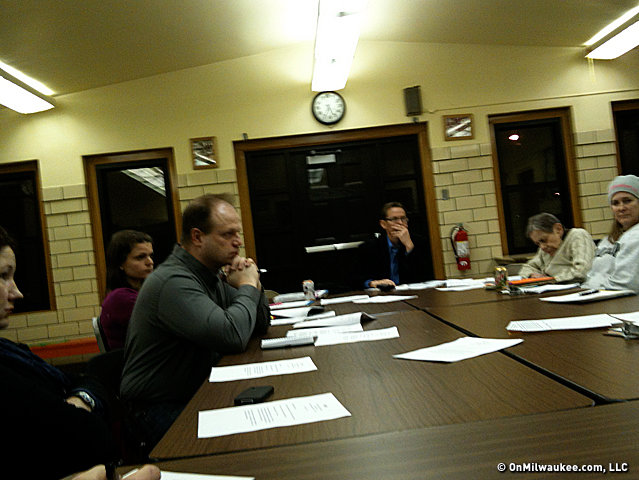The parents and staff at 68th Street Early Childhood Education Center on 68th and Moltke Avenue have reason to celebrate. At least for now.
For the second straight year, the school, built in 1917 and acquired by MPS when the city annexed the land on which it sits, has faced closure. Last year, the community won. This year, frankly, it seemed almost a foregone conclusion that it would close.
But at a meeting of the board's Committee on Accountability, Finance and Personnel, board members voted to allow Superintendent Gregory Thornton's request for an extension so that the administration could explore options other than closure.
That's a victory for the school community, which came out in force in green shirts, armed with signs and information packets that they distributed to board members.
In the packet was demographic information, articles on the importance of early childhood education, a list of facts challenging the numbers that the administration has used to justify the closing and, most important, some ideas for plans to keep the school alive.
Ald. Michael Murphy, who represents the district in which the school is located, was among the many who spoke in favor of preserving the program.
The testimony and the proposals from the school were compelling enough to allow the board to give the administration time to go back to the drawing board and explore some of the plans.
One plan suggested moving the program intact to 65th Street School, at 65th and Melvina. That school is also tabbed for closure and the committee passed a motion last night to move that item forward to the board.
A shortcoming of that idea is that it has little or no support from the neighborhood associations of Lenox Heights, where the school is located, and neighboring Enderis East, Enderis Park, Alameda Place and Cooper Park.
According to testimony at the meeting, those groups do, however, support the two-option plan of merging the program with nearby 81st Street School. The first option would close 68th and move the program intact to 81st Street. But to do that, the program at 81st Street must shrink. To accommodate the move the plan suggests phasing out the middle school grades at the K4-8 81st Street.
This option seemed to catch the ear of the administration, which asked for the extension in order to discuss the plan with the 81st Street School community.
Less interesting to the board was the idea of keeping 68th Street School open as the early education center for its kids and those at 81st and having 68th Street School feed into a 1-8 program at 81st Street.
A number of board members confirmed the idea that the 68th Street building is simply inadequate and should be closed.
As is happening in a number of neighborhoods, including Bay View, parents in the communities surrounding 81st Street School are urging the district to once again make that a neighborhood school.
Meanwhile, no one argues about the quality of the educational program at 68th Street. The question, really, boils down to money.
In its current configuration, the program has 262 children in K3, K4 and K5. According to the district, 55 percent of those kids are 3-year-olds for which the district receives no state funding. Three- and 4-year-olds attend half-day programs.
Attrition from the district is high at the school and 35 percent of the 5-year-olds enrolled at 68th Street School in June were no longer in the district by September.
According to the administration, transportation costs are excessive at the school, too. Students at 68th Street live in 54 MPS attendance areas and it costs $2,159 to transport the average regular education student to 68th Street School. That's more than three times the district average of $631.
The discussions about adequacy of the 68th Street building have recurred for decades. A number of programs have come and gone over the years – including French Immersion – but seem to always end up restricted by the building's 22,259-square foot size.
An addition was built in 1930, suggesting that just over a decade after the building was constructed it was already inadequate.
A 1947 newspaper article discussing the changing facilities needs of the district noted that the most urgent project at the time was the construction of – wait for it – 81st Street School.
"Pupils of this district now attend Sixty-Eighth Street school, badly overtaxing its facilities," the article noted.
What comes around goes around.
As the district aims to continue and expand successful programs and, at the same, sort out its excess capacity, the 68th Street School story is a compelling one.
It is one in which quality and community desires do battle with money. I hope that the district can work out a plan that lets both sides win.
Born in Brooklyn, N.Y., where he lived until he was 17, Bobby received his BA-Mass Communications from UWM in 1989 and has lived in Walker's Point, Bay View, Enderis Park, South Milwaukee and on the East Side.
He has published three non-fiction books in Italy – including one about an event in Milwaukee history, which was published in the U.S. in autumn 2010. Four more books, all about Milwaukee, have been published by The History Press.
With his most recent band, The Yell Leaders, Bobby released four LPs and had a songs featured in episodes of TV's "Party of Five" and "Dawson's Creek," and films in Japan, South America and the U.S. The Yell Leaders were named the best unsigned band in their region by VH-1 as part of its Rock Across America 1998 Tour. Most recently, the band contributed tracks to a UK vinyl/CD tribute to the Redskins and collaborated on a track with Italian novelist Enrico Remmert.
He's produced three installments of the "OMCD" series of local music compilations for OnMilwaukee.com and in 2007 produced a CD of Italian music and poetry.
In 2005, he was awarded the City of Asti's (Italy) Journalism Prize for his work focusing on that area. He has also won awards from the Milwaukee Press Club.
He has be heard on 88Nine Radio Milwaukee talking about his "Urban Spelunking" series of stories, in that station's most popular podcast.




